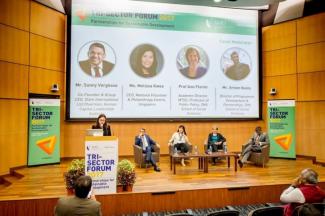
- Partnerships among multi-sector stakeholders essential to achievement of Sustainable Development Goals
- Forum showcased innovative cross-sector partnerships addressing emerging “Glo-cal” challenges
- Pushing boundaries and professionalising the practice of tri-sector collaborations for a more sustainable and equitable future
On 25 September 2015, member states of the United Nations adopted a set of goals to end poverty, protect the planet, and ensure prosperity for all as part of a new sustainable development agenda. Of the 17 “Sustainable Development Goals” targeted to be achieved by 2030 to transform the world, the last is “Partnerships” – a means to achieve the other 16 ambitious and substantive goals such as ending extreme poverty and hunger, improving human well-being, and reversing the worst of environmental degradation.
For the vision to be realised, everyone needs to do their part and diverse stakeholders need to work in solidarity: governments, the private sector, and civil society.

[Photo: The Tri-Sector Forum 2017.]
The Third Annual Tri-Sector Forum held on 18 May 2017 showcased how innovative cross-sector partnerships can address emerging “Glo-cal” challenges – those that individual nations face, but are also shared across the globe. Organisations and societies must ensure the sustainability not only of their operating and financial models, but equally the sustainability of our shared human, social and natural capital.

[Professor Gerry George, Dean of Lee Kong Chian School of Business and Lee Kong Chian Chair Professor of Innovation and Entrepreneurship, SMU, giving brief opening remarks.]
Professor Gerry George, Dean of Lee Kong Chian School of Business and Lee Kong Chian Chair Professor of Innovation and Entrepreneurship, SMU, who attended the event and was invited to give brief opening remarks, made three points before the forum started. He said, “Passion is not enough, we need to galvanise action. In good partnerships, the benefits of collaboration must far exceed the cost of coordination. And lastly, the value captured by each partner from tri-sector partnerships should always be less than the value created – so that there are benefits left on the table for society.”

[Mr Sunny Verghese, Co-Founder and Group CEO of Olam International Ltd and Chairman of Human Capital Leadership Institute, giving his keynote speech.]
Keynote speaker, Mr Sunny Verghese, Co-Founder and Group CEO of Olam International Ltd and Chairman of Human Capital Leadership Institute, shared his case for sustainability via Olam’s example and his rich expertise in sustainable development. Olam International, a leading global agri-business, is co-creating an industry coalition to set new standards for sustainability and responsible practices in the agri-business sector. Helping the audience to appreciate sustainability and understand its significance and challenges through Olam’s lenses, he pointed out that sustainable development sensibilities can be balanced with clear business advantages, bigger purposes, and value creation for society.
The forum’s panel discussions and presentations also covered issues on inclusiveness and equity, which are core to sustainability of societies.

Ms Melissa Kwee, CEO of Singapore’s National Volunteer & Philanthropy Centre, who was a panelist, called for SMEs to play a bigger role, instead of just counting on large companies. She added that we need an “awakening of moral imagination and courage” and more leaders.

Professor Ann Florini, Academic Director of MTSC and Professor of Public Policy with SOSS, SMU, highlighted Ms Kwee’s point that “change happens at the speed of trust”. She added that the MTSC programme empowers leaders with the knowledge to understand major social challenges and the skills to address them collaboratively.



[Photos: The three presentations by groups of graduating MTSC participants during the forum featured highlights of their capstone projects.]
After the plenary session, the forum featured interactive workshops conducted by the graduating cohort of MTSC participants. These culminated the learning and outcomes of their group capstone projects, and the workshop breakout discussions augmented the insights and actionable steps. Three topics were covered: “Powering Up: Affordable Clean Energy in the Philippines”, “Singapore’s Urban Food Production: Envisioning a Shared Future” and “‘Reintegrative Employment’ for Ex-Offenders: Structural Versus Human Barriers”.



[Photo: Three interactive workshops with participants were conducted by the graduating cohort of MTSC students after the plenary session.]
About 200 participants, comprising guests from various sectors – government, non-governmental organisations, businesses and academia across industries including social services, finance, food and agriculture – attended the event held at the Ngee Ann Kongsi Auditorium. Among them were also alumni, current MTSC participants, industry partners, and SMU faculty and staff.
Organised by the SMU School of Social Sciences’ (SoSS) Master of Tri-Sector Collaboration (MTSC) programme, the Tri-Sector Forum brings together leaders from the government, businesses and civil society organisations to discuss the crucial role of cross-sector collaboration in addressing Asia and the world’s complex challenges.
The annual event is organised as part of SMU SoSS’ Tri-Sector Initiative, which provides thought leadership on the growing significance of cross-sector partnerships, creating a hub for cutting-edge thinking on collaborative governance. The Tri-Sector Initiative conducts rigorous research and convenes gatherings such as the Tri-Sector Forum and seminars. Also, through its unique MTSC programme, seeks to professionalise the practice of partnership and provide emerging leaders from businesses, governments and civil society organisations with the interdisciplinary skills and knowledge to become collaborative leaders who create high impact partnerships to tackle the world’s big problems.
The first-of-its-kind MTSC programme was launched in 2013 and bridges the government, business and civil society sectors to develop solutions for more sustainable and equitable futures.
2017 also marks SoSS’ 10th year of establishment.
For more information, please visit http://socsc.smu.edu.sg/master-tri-sector-collaboration/tri-sector-forum
[Featured photo: The panel members commencing discussion during the forum.]
###